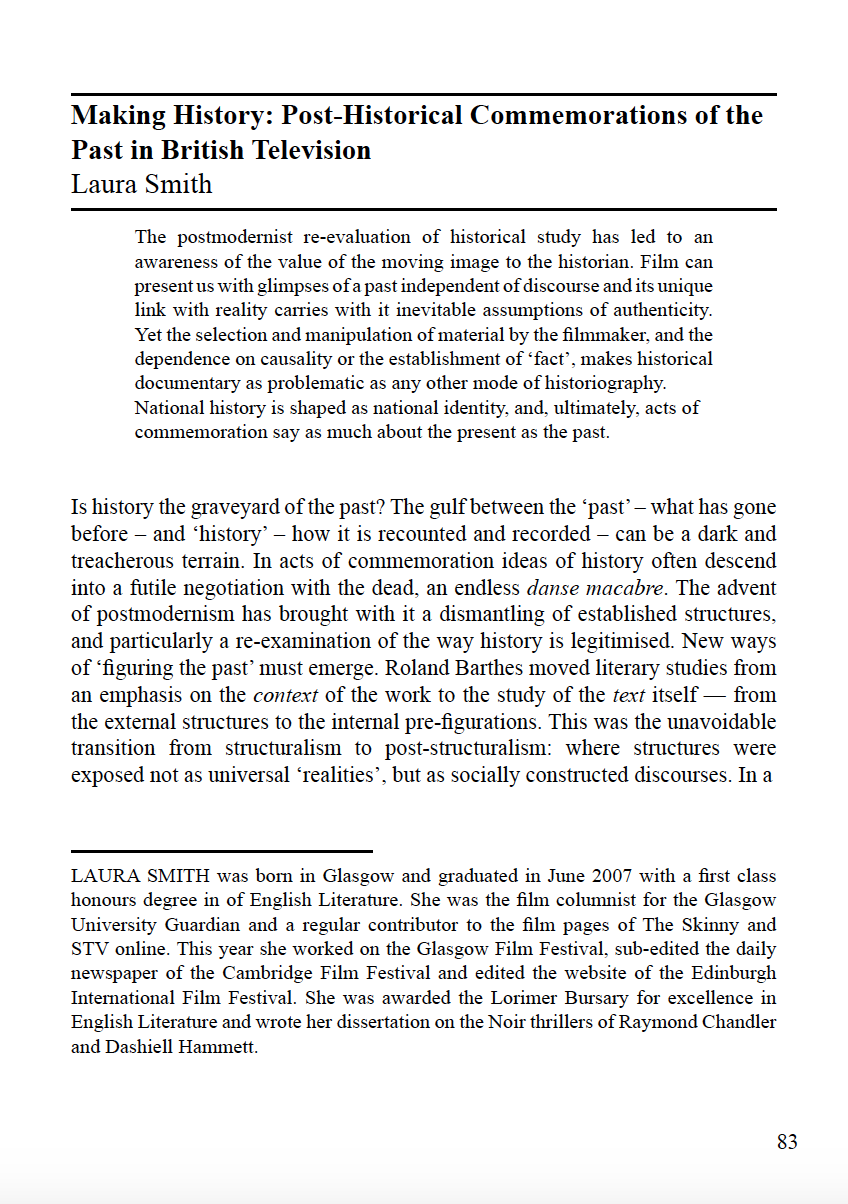Making History
Post-Historical Commemorations of the Past in British Television
DOI:
https://doi.org/10.36399/GroundingsUG.1.277Keywords:
Documentary, The World at War, History, Historiography, National History, TelevisionAbstract
The postmodernist re-evaluation of historical study has led to an awareness of the value of the moving image to the historian. Film can present us with glimpses of a past independent of discourse and its unique link with reality carries with it inevitable assumptions of authenticity. Yet the selection and manipulation of material by the filmmaker, and the dependence on causality or the establishment of ‘fact’, makes historical documentary as problematic as any other mode of historiography. National history is shaped as national identity, and, ultimately, acts of commemoration say as much about the present as the past.
References
Ankersmit, Frank. History and Tropology: The Rise and Fall of Metaphor. Berkeley, Los Angeles and London: University of California Press,1994.
Auschwitz — The Nazis and the Final Solution. Directed by Laurence Rees. 2005. Digital Versatile Disc.
Baudrillard, Jean. The Gulf War did not take place. Translated by Paul Patton. Bloomington: Indiana University Press, 1995.
Conspiracy. Directed by Frank Pierson. 2001. Digital Versatile Disc.
Elliot, T.S. The Waste Land: and Other Poems. London: Faber and Faber, 1940.
Elsaesser, Thomas. “‘One Train may be Hiding Another’: Private History, Memory and National Identity.” Available from http://www.latrobe.edu.au/screeningthepast/classics/rr0499/terr6b.htm Internet: accessed 30 May 2007.
Houston, Penelope. Keeper of the Frame: The Film Archives. London: British Film Institute, 1994.
Isaacs, Jeremy. See The World at War.
Jenkins, Keith. “What History Is.” In Re-Thinking History. Edited by Keith Jenkins. London: Routledge, 1991.
Munslow, Alan. “Introduction.” The Postmodern History Reader. Edited by Keith Jenkins. London: Routledge, 1997.
Schindler’s List. Directed by Steven Spielberg. 1993. Digital Versatile Disc.
Siebert, Detlef. “Historical Accuracy and the Making of ‘Auschwitz’.” Available from http://www.bbc.co.uk/history/war/history_drama_01.shtml. Internet: accessed 30 May 2007.
Triumph of the Will (Triumph des Willens). Directed by Leni Riefenstahl. 1935. Digital Versatile Disc.
Virillo, Paul. War and Cinema: The Logistics of Perception. London, New York: Verso, 1999.
White, Hayden. “The Value of Narrativity in the Representation of Reality.” In On Narrative. Edited by W.J.T. Mitchell. London: The University of Chicago Press, 1981.
World at War, The. Executive Producer Jeremy Isaacs. London: BBC, Thames Television, 1973.

Downloads
Published
Issue
Section
License
Copyright (c) 2007 Laura Smith

This work is licensed under a Creative Commons Attribution 4.0 International License.
The CC BY 4.0 license is a Creative Commons license. This is a non-copyleft free license that is good for art and entertainment works, and educational works. It is compatible with all versions of the GNU GPL; however, like all CC licenses, it should not be used on software. People are free to: Share — copy and redistribute the material in any medium or format; Adapt — remix, transform, and build upon the material for any purpose, even commercially. The licensor cannot revoke these freedoms as long as you follow the license terms. But they must conform to the following terms: Attribution — You must give appropriate credit, provide a link to the license, and indicate if changes were made. You may do so in any reasonable manner, but not in any way that suggests the licensor endorses you or your use. No additional restrictions — You may not apply legal terms or technological measures that legally restrict others from doing anything the license permits.
Please check individual article PDF copies to see if any additional restrictions apply.







